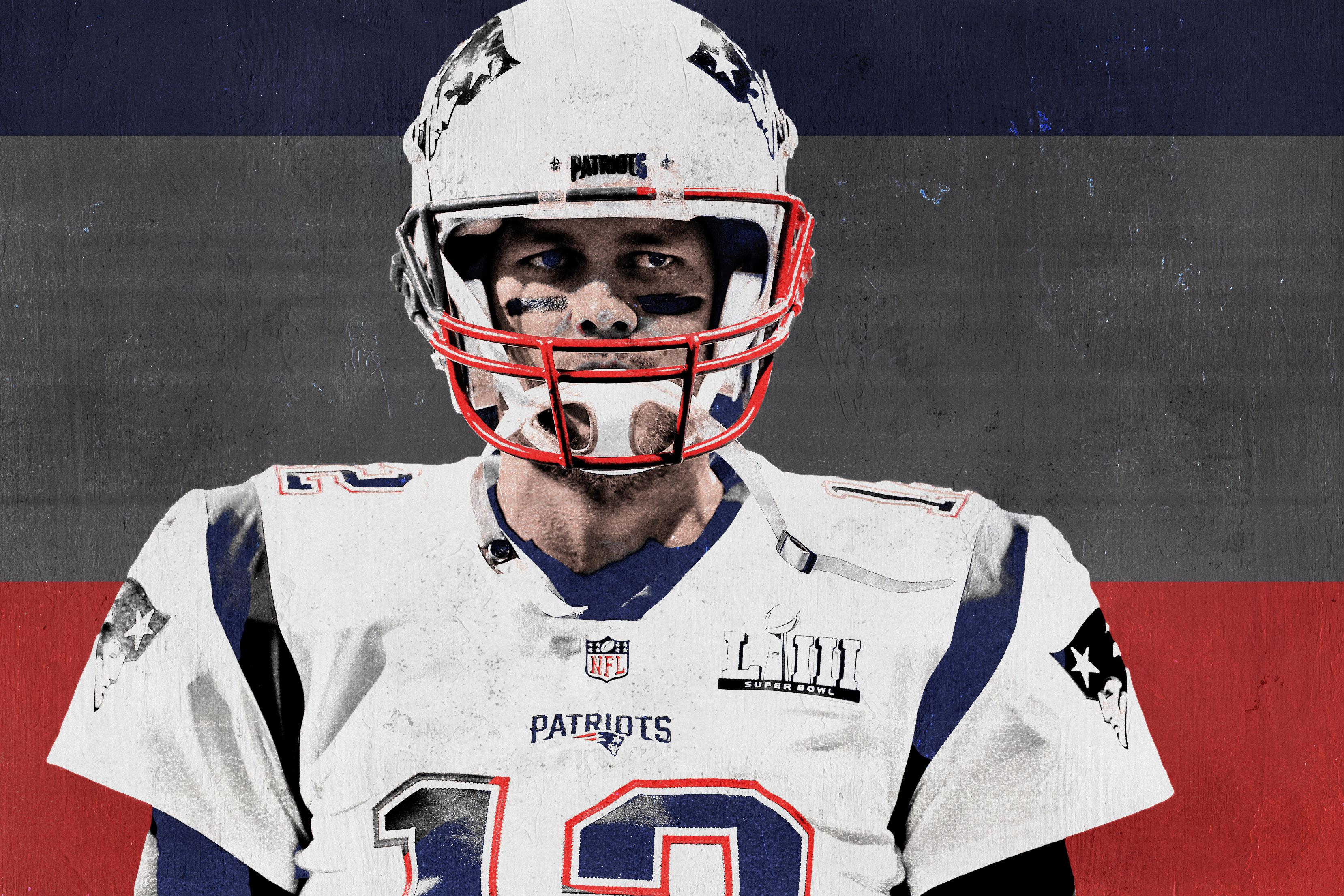
Do you hate the New England Patriots? Sorry—do you hate the Super Bowl LIII–winning, NFL-champions-for-the-sixth-time, greatest-dynasty-in-the-history-of-gridiron-football, kind-of-horrifically-unstoppable New England Patriots? I do! All week, ahead of the game, I felt a vague hornet’s buzz in the back of my brain at the thought that Tom Brady and Bill Belichick were about to win yet another title, and then just, like … stand there, being annoying, with their faces.
I’ve been trying to think about why I feel this way. What a silly thing, after all, to hate a sports team. Human, but silly. (I’m tempted to add: like most things to do with sports.) The world has bigger problems than whether the Patriots and their blandly handsome, handsomely smug, smugly bland quarterback lift a trophy. When I say this to myself, though, what my brain sends up by way of rebuttal is: buzzzzz.
I keep coming back to the idea that there are two ways of experiencing football, with the Patriots, for reasons not entirely in their control, having come to represent, for many of us, the second, far less rewarding and enjoyable way. I’ll try to explain what I mean by that.
A few years back I was driving from Ponca City, Oklahoma, where I grew up, to Oklahoma City. My parents live in OKC these days, and, consequently, I now spend a lot more time there than I do in my hometown. The visit just concluded was my first trip back to Ponca City in—how long? A decade? Something like that. More time, at any rate, than a person should let pass without going home. I hadn’t gone back for any reason. I just wanted to see the place again. Now it was late at night, or anyway, it was dark; it can’t have been truly late, because there was a football game on the radio.
When I say it was dark, I don’t want you to picture the chalky-glowy freeway pseudo-night you see around big cities or all up and down the East Coast. I mean it was dark. Godless prairie dark, nothing visible except near-field highway and a few faraway white lights, separated by unreadable elevations. Every now and again the headlights of another car would appear and take a long time getting closer. On the radio I kept switching back and forth between the football game—no idea who was playing—and some station in the low-80s FM, an obscure college-ish stream that was playing what I remember as some of the weirdest and most beautiful music I’ve ever heard in my life. Those songs—I wish I could tell you anything about them. I never caught any names. I don’t even know what genre they were from. They were all instrumentals. There was one in particular that made me feel like my mind was being rewired. For my mind’s sake, I wish I could find it again. There were two guitars, playing high up—it was spacey, shivery music—and they kept coming in on slightly unexpected pitches so that they seemed to detune each other and then retune according to some wholly new system of harmony. Sometimes America affords you these moments of throwaway transcendence. Everyone out here, I thought, everyone in this darkness, is sharing this moment, and I am sharing it too. Then I’d flip over to the football game for five minutes and then flip back.
Obviously, this memory has nothing to do with the Super Bowl. Very little to do with football, even. But when I try to come to grips with what the game means to me at this moment, it’s scenes like this that come back to me. Often it’s this scene. Maybe that sounds strange? After all, the small, unfocused, intimate experience I’m describing is the utter opposite of what we’ve just seen in the NFL’s championship telecast. The Super Bowl version of football is about money and screaming and jets. It’s about commercials in which Cobra Commander goes to Home Depot. It’s about CGI flames engulfing the words “UP NEXT—THE OUTBACK STEAKHOUSE COIN TOSS.” It’s about Roger Goodell saying “organizational priorities” while sporting Tom Clancy’s idea of a fashion-forward haircut. It is, supremely and aggressively, about TV.
That’s the football we know from CBS. My point is that it’s not the only football there is. Football is still the sport that’s most intertwined with the breadth of this country’s landscape, with small, local, and peculiar American places. What I’m talking about is hard to define, maybe, without sounding pretentious. Fine. You surely feel it too. Basketball takes place indoors. Baseball takes place in an alternate dimension where it’s always at least kind of 1912. Football is in the rocks and waters. To say otherwise is to deny your eyes and ears. It’s a spiritual thing, if you like. It’s also an architectural fact. When you are driving through some warehouse district and a stadium rears up out of nowhere, it’s a football stadium. When you see floodlights in the distance, more often than not it’s a high school football game. The overlay of football on American life is simply different from that of any other sport. It’s there when you’re looking for it and when you’re not. Often that makes it more poisonous, of course. Most of the time it does. It’s also why I can’t bring myself to hate football, despite all the reasons football gives me, regardless of how often I tell myself I should.
Which brings us back to the Super Bowl and its many, many punts. It’s not surprising that the way people feel about football is commercially exploitable. Curious, though, how little the commercial-exploitation version of the sport resembles the everyday-life version. Of course the distinction I’m drawing is to some extent artificial, but still: You have the crowd at a high school game, blankets, Thermoses, visible breath, and then you have AND TWINS. Between them, a gulf.
One trouble with writing about why people hate the Patriots is that everything one can say about the subject has been said, and more than once. It’s been said so many times that the repetition of the litany of reasons to hate the Patriots has itself become a reason to hate the Patriots.
I mean … Deflategate? Really, you want to talk about it? Just writing the word drains a few PSI from my soul. The TB12 patent-medicine nonsense? I’m not pliable enough to go back there. The MAGA stuff is kind of interesting—region of the country most hostile to President Donald Trump, coach and star player most indelibly associated with him—but in the end, it’s yelling about a hat in a locker, which seems like something Trump would want us to do.
I have nothing new to add to any of this. What I have, instead, is a thought about that gulf. It’s a simple thought. It starts with America’s highly fraught relationship with winners. Have you noticed how strange this is? On some highly theoretical level, America loves winners. On a concrete, everyday level, though, America, given no preexisting rooting interest, is driven batshit by winners and pulls for underdogs at all costs. That this is inescapably a self-defeating dynamic—the underdogs will lose, which is disappointing, or they will win, which will make them winners, and thus accelerate the moment when we’ll learn to hate them—doesn’t alter the basic facts. No part of loving sports is about being in command of your own heart.
That’s not the thought, though. It’s the background. The thought is this. What if we imagine the NFL as a machine for converting one version of football (the local, weird, particular, rooted version, the one you can experience as part of lived reality and not just on TV) into the other version (the Flaming Doritos This Is Sparta Laser Clydesdale Dot-Com Bullshit one)? And what if, on some level, people feel this and hate it? You can be dazzled by a spectacle and still resent the way it’s cheapening something you care about. The internet is doing that to all of us all the time, which is why the people who most hate being online are the same people who spend all day on Twitter, but that’s a separate column.
My point is, if something like that emotional dynamic is operating in football—with a million caveats and footnotes about the slipperiness of “authenticity,” of course, but if this theory is broadly applicable—then which players and teams are least sullied by the process? Who’s spent the least amount of time in the machine? Underdogs, right? And who’s spent the most? Winners. Underdogs seem like they still have some connection to the world the rest of us live in. It’s winners who have had their very nuclei converted into television. And no team in recent sports history has won as relentlessly as the Belichick-Brady Patriots. That’s why it was so outrageous when some people around the Patriots tried to position them as underdogs during the playoffs. You can be behind per the betting odds; you’re not an underdog if your atoms are made of T-Mobile ringtones.
I don’t want to present this as some grand unified theory of Patriots hatred. Or Warriors hatred (remember when the Splash Brothers seemed like a lovable breath of fresh air?), or Duke hatred, or whatever. There are specific reasons to despise all those teams. But that’s also part of the point: There are always specific reasons to despise a team that wins a lot. Underneath those reasons, there’s a reason. It has to do with some things sports culture has no language for, things like love converted into product, reality corroded, and some other stuff it’s depressing to talk about. Over and above any individually unlikable characteristics Tom Brady possesses, that’s what I see when I look at him. It’s a bummer to see the machine validated with championships as if championships had the power to validate anything that matters.
But love and reality are strong. I believe that. The Patriots’ dynasty didn’t end this year, and even if it had, it would be replaced by only something equally cynical. Sports isn’t about to deserve what we give it. There’s hope, though, in the giving. Football is a strange game, and this is a strange country. There are highways where there’s darkness.

